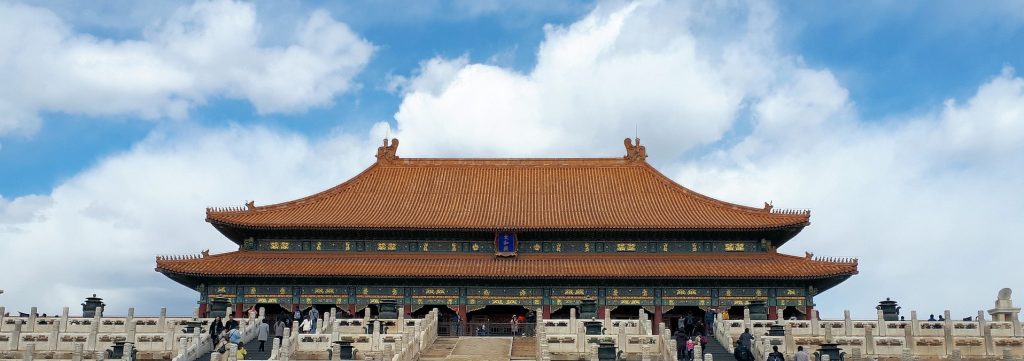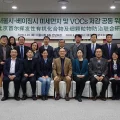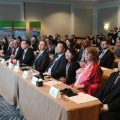2020 Beijing International Forum for Metropolitan Clean Air and Climate Actions

In welcoming the first International Day of Clean Air for blue skies, and responding to the global advocacy for action, the 2020 Beijing International Forum for Metropolitan Clean Air and Climate Actions was hosted on September 7 as a parallel event of the International Day. Hosted by the Beijing Municipal Bureau of Ecology and Environment (BEE), the Beijing International Forum for Metropolitan Clean Air and Climate Actions has been an annual professional forum in the field of ecological environment since 2017. ICLEI East Asia has been recognized as a co-host of the Forum since 2019.
Themed “Synergistic Clean Air and Climate Action in the Energy and Transportation Sectors”, this year’s Forum gathered representatives from the Ministry of Ecology Environment of China, the UN Environment Programme(UNEP), international metropolises of California, London, Paris, Tokyo, Seoul, and Hong Kong, as well as experts from universities and research institutions, to exchange and share the air quality and climate planning goals, policies, measures, actions and achievements of their cities, with a special focus on the co-control of air pollutants and GHG emissions.

2020 Beijing International Forum for Metrpolitan Clean Air and Climate Aciton successfully hosted / Source: ICLEI
As the host of the Forum, Tian Chen, Director of BEE, warmly welcomed the guests and the speakers who were attending either in-person or virtually. Ruihe Tu, Head of the UNEP China Office, emphasized the efforts China has made in solving its local environmental problems while taking practical actions in combating global climate change and greenhouse gas emissions.
Helena Molin Valdés, Head of the Climate and Clean Air Coalition Secretariat hosted by UNEP, congratulated the continuous improvement of air quality in Beijing in the past few years. In particular, the average annual concentrations of Fine Particulate Matter (PM) have drastically decreased from 89.5 mg/m3 in 2013 to 42 mg/m3 in 2019, whereas the carbon emission intensity has dropped by 43% between 2010 and 2019.

Professor Jiming Hao, School of Environment, Tsinghua University and Member of the Chinese Academy of Engineering /Source: ICLEI

Helena Molin Valdés, Head of the Climate and Clean Air Coalition Secretariat / Source: ICLELI
In fact, the UNEP report “A Review of 20 Years’ Air Pollution Control in Beijing” published in March 2019 has pointed out that, as one of the most representative cities in developing countries, the lessons, policies, and actions of Beijing’s air quality management could help guide pollution reduction measures in other cities around the world. The city is also looking to come up with more specific and concrete ideas, targets, measures, and models to further improve local air quality during the 14th Five-Year Plan period.
Beijing’s effort in developing low-carbon transport and carbon forestry in recent years has come with fruitful results. For example, Beijing Bus has successfully lowered its diesel consumption and CO2 emission by 50% and 15% respectively, despite its total operating mileage being on the rise between 2016 and 2019. On the other hand, Beijing Subway is piloting reservation systems at two stations, which would allow passengers to save waiting time at stations by scheduling their entry time in advance.

From the left: Ye Wu, Deputy Dean of School of Environment, Tsinghua University; Yan Xu, Deputy Chief of Green Transport Division,
Beijing Municipal Commission of Transport; Dengli Ming, Chief of the Science and Technology and International Cooperation Division
and the Climate Affairs Division, BEE; Aiping Lian, Deputy Chief of the Vehicle Emissions Management Division, BEE;
Lu Fu, Head of the Clean Air Asia China Office / Source: ICLEI
Beijing’s goal is to form a green transport network by 2022, raising the green mobility rate in the metropolitan area to over 75%. Dengli Ming, Chief of the Climate Change Division in BEE, emphasized the necessity to recognize the importance, complexity, and interdisciplinarity of climate change actions. The city will take the opportunity of hosting the 2022 Winter Olympics to continuously improve the co-control of air pollutants and GHG emissions in heavy-polluted industries including the energy sector, buildings and construction, and transportation, and move further towards the ultimate goal of “Clean Air for blue skies” while realizing low-carbon development.
Su-Yong Jeong, Deputy Mayor and Head of Climate and Environment Headquarters of Seoul, shared the city’s strategies, specific actions, and experiences in tackling PM and GHG emissions. Seoul has thrivingly reduced 2.76 million tons of GHG between 2005 and 2017 and has managed to bring down its PM concentration level to around WHO standards in 2010; yet, the city has been having difficulties in making further breakthroughs afterward.

Su-Yong Jeong, Deputy Mayor and Head of Climate and Environment Headquarters of Seoul / Source: ICLEI
To improve the air quality in the city, Seoul has taken a number of measures including the creation of low emission zones (LEZ) and green transportation zones, restriction of grade 5 high emission vehicles, phasing out of diesel vehicles, and closing down of public parking lots on days of heavy pollution. At the same time, the city has also pushed forward projects on the green renovation of old public buildings, smart energy city, and urban forest planning, which would help reduce air pollution and GHG emissions significantly. In addition, Seoul has also set its goal to send zero waste to landfills by 2025.
During the session “Impact and Implications of the COVID-19 Pandemic on Air Quality and Carbon Emissions” on the second day of the Forum, Shu Zhu, Regional Director and China Representative of ICLEI East Asia presented the results of bilateral research on air quality management between Beijing and Seoul. The research specifically looked into the air quality measures the two East Asian capitals have taken in the fields of boiler replacement, vehicle control, fugitive dust management, and seasonal control, and provided practical recommendations for fostering international cooperation and exchange for sustainable development.

Shu Zhu, Regional Director and China Representative of ICLEI East Asia / Source: ICLIE
As the co-host of the Forum, the ICLEI Beijing Office also assisted in inviting and facilitating representatives from Mongolia and Singapore to share their local actions and accomplishments through online participation. Davaajargal Gan-Ochir of Ulaanbaatar’s Department of Against Air Pollution, presented the city’s integrated policy design which targets both GHG and air pollutant emissions; whereas. Limin Hee, Director of Research at the Centre for Liveable Cities in Singapore, highlighted that the city has adopted dynamic governance that upholds the principles of pragmatism and practicality in integrating land use and transport planning to create a high-density transit-oriented city.

Limin Hee, Director of Research at Centre for Liveable Cities in Singapore / Source: ICLEI




